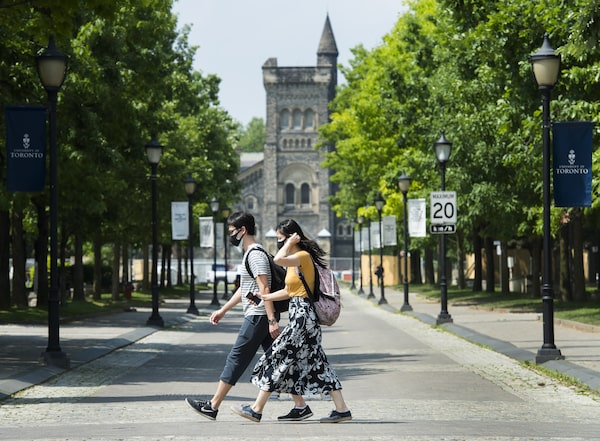
Students who receive scholarships get to spend more time focusing on school and less time working jobs to cover tuition and the cost of living. People walk past the University of Toronto campus in Toronto on Wednesday, June 10, 2020. THE CANADIAN PRESS/Nathan DenetteNathan Denette/The Canadian Press
An expert is urging Canadian universities and colleges to be proactive about preventing monkeypox from gaining a foothold on campus.
University of Manitoba virologist Jason Kindrachuk says schools should be raising awareness about the risks of monkeypox as students prepare to come together this fall.
Kindrachuk notes that, so far, monkeypox cases in Canada have been concentrated among men who reported intimate sexual contact with other men, but the virus can spread to anyone through extended close contact.
He says students could face an elevated risk as back-to-school season brings crowded social events, cramped living quarters and high rates of sexual activity.
Kindrachuk says schools can help keep students safe and reduce stigma surrounding the virus by sharing information about signs of the illness and steps they can take to protect themselves.
Universities in Ontario and Quebec, where the majority of Canada’s monkeypox cases have been detected, say they’re taking steps to manage the risks of the disease as part of their public health strategies.
The University of Toronto says no cases of monkeypox have been reported on its campus, but it’s providing students with resources where they can learn more about the disease and what to do in case of exposure.
Toronto Metropolitan University says it’s developing protocols to deal with potential infections on campus, particularly in residences.
In Montreal, Concordia University says it’s looking to reconvene a group that addresses concerns about infectious diseases, including monkeypox, with a focus on campus housing.
McGill University says its student wellness centre offers information and resources about a range of health-related concerns, including monkeypox.
Monkeypox, which comes from the same family of viruses that cause smallpox, has been endemic in parts of central and west Africa for decades and was not known to trigger large outbreaks beyond the continent until May.
The virus spreads through close, often skin-to-skin, contact with an infected person’s lesions, their clothing or bedsheets. Symptoms can include rash, swollen lymph nodes and fever, and typically last two to four weeks.
On Wednesday, federal officials reported that there were 1,206 confirmed monkeypox cases in Canada, including 583 in Ontario and 471 in Quebec.
Our Morning Update and Evening Update newsletters are written by Globe editors, giving you a concise summary of the day’s most important headlines. Sign up today.